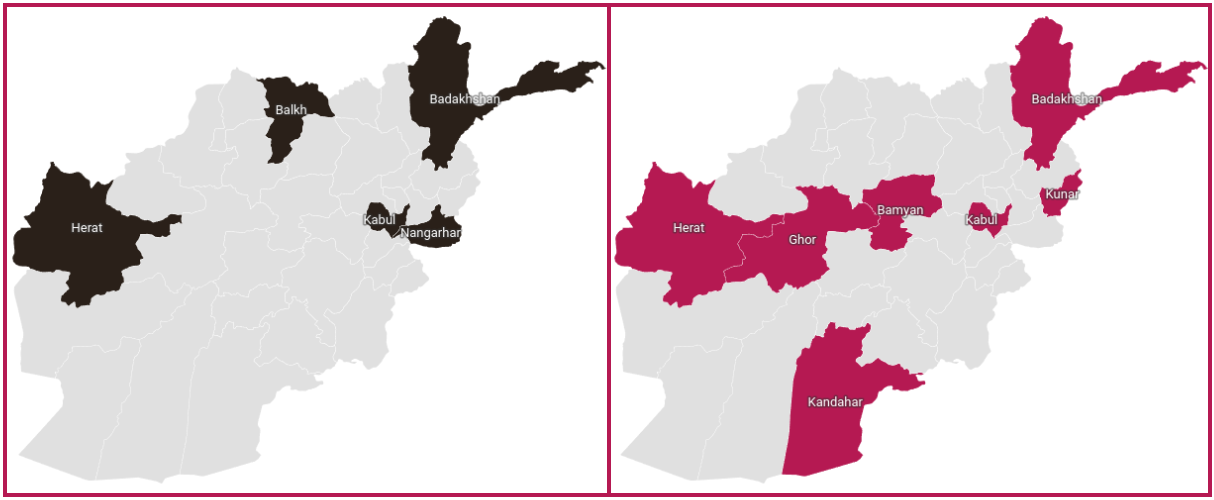On 2 June 2024, multiple media outlets reported the killing of Mullah Hassan, a Taliban army company commander, and the wounding of his bodyguard, Lala Khan, in an ambush by unknown militants in Shineh Pass, Dawlatyar district, Ghor province.
Initially, another source described the incident as a clash between two Taliban commanders in the area. Subsequently, Islamic State Khorasan Province (ISKP) claimed responsibility for the attack: “the Khilafah (Caliphate) soldiers targeted a commander in the murtad (apostate) Taliban militia, in the village of Shineh [sic] in the Dawlatyar district of Ghor, with machine gun fire, which led to his death, along with his guard.”
On the same day, another Taliban official, Mawlawi Sayed Noor Mohammad Qital, the Deputy Field Intelligence Officer for Ghor Police Headquarters, was reportedly shot and killed by unknown gunmen in the province’s Shahrak district. Some accounts on X (formerly Twitter) noted that ISKP initially claimed responsibility for Qital’s assassination in Shahrak district, but later issued a corrected statement clarifying that they had killed a Taliban commander in Dawlatyar district.
On 5 June 2024, a pro-Taliban account claimed that the Taliban had arrested the alleged perpetrator of the attack, at a location in Herat province. The National Mobilisation Front (NMF), an anti-Taliban resistance group, also claimed responsibility for killing Qital. However, the NMF did not provide evidence to support this claim, and has a history of falsely claiming attacks they did not carry out.
ISKP expanding area of operations
AW note that the ambush of Mullah Hassan was the first incident claimed by ISKP in the Ghor province during the Taliban administration. Under the Republican administration, ISKP claimed seven attacks in Ghor province between 14 November 2016 and 21 April 2021: six in the provincial capital, Firuzkoh, and one in Dawlatyar district. The targets included Afghan National Defence and Security Forces (2), the Taliban (4), and Shia communities (1).
Among the 13 attacks claimed by ISKP in Afghanistan thus far in 2024, four occurred in Kabul, three in Kunar, two in Kandahar, and one each in Badakhshan, Herat, Ghor, and Bamyan provinces. Except for Bamyan, all of these provinces have a history of ISKP attacks either before or during the Taliban administration.
When compared to the same time period last year, AW observed an expansion of ISKP areas of operation. Between 1 January and 8 June 2023, ISKP claimed 13 attacks in five provinces in Afghanistan. Within the same time frame in 2024, the group reported activity by claiming 10 attacks in seven provinces. Given the group’s historical focus of operations in eastern Afghanistan and Kabul, the geographic scope of this year’s pattern of claimed attacks is significant. The locations of attacks span from the east of the country (Kunar) to the west (Herat), and from the north (Badakhshan) to the south (Kandahar), as well as the central highlands (Bamyan).
 Figure: Provinces with ISKP claimed attacks between 1 January and 8 June 2023 (left), versus ISKP claimed attacks in Afghan provinces between 1 January and 8 June 2024 (right).
Figure: Provinces with ISKP claimed attacks between 1 January and 8 June 2023 (left), versus ISKP claimed attacks in Afghan provinces between 1 January and 8 June 2024 (right).
Taliban operations against ISKP
AW has observed that ISKP appears to be increasing their activity, both in terms of volume and area of operations, despite Taliban claims of conducting raids against the group’s cells.
On 31 May 2024, several pro-Taliban accounts reported on X that the Taliban had arrested five ISKP members from two different locations in Herat City. On 1 June 2024, Taliban-affiliated anti-ISKP media outlet Al Mersaad provided details, stating that Taliban special forces had conducted an operation against a significant ISKP network in Herat province, leading to the arrest of several key active members.
According to Al-Mersaad, this particular network was responsible for a series of attacks in Herat province, including a recent attack targeting the Shia community in a mosque in Guzarah district. Al Mersaad reported that a number of the detained ISKP members had recently travelled to Balochistan, Pakistan, from where ISKP allegedly coordinates its operations in Afghanistan and neighbouring countries.
On the same day, the Spokesman for the Taliban’s Governor of Herat, Nisar Ahmad Elyas, posted a video statement on X regarding anti-ISKP operations in the province. The message announced the arrest of a group responsible for multiple deadly attacks against Shia communities in Herat over the past eight months, including the attack in Guzarah district. He further stated that during the operation, Taliban special forces had recovered an explosive vest, a vehicle, and weapons. The video did not disclose the exact number of individuals arrested.
After limited activity between January and March, ISKP has conducted a number of attacks in multiple provinces. AW observed a wider area of operations and a large array of attack methods.
These attacks include the first incident of targeting of western individuals, the first attack in Ghor since 2021, the first targeted attack on Shias in Herat, as well as a person-borne improvised explosive device attack in front of the New Kabul Bank in Kandahar, and the targeting of energy infrastructure in Kabul. AW assesses that the recent increase in ISKP attacks demonstrates that periods of inactivity do not necessarily indicate an absence of the group in the country or the success of Taliban counterintelligence measures.


